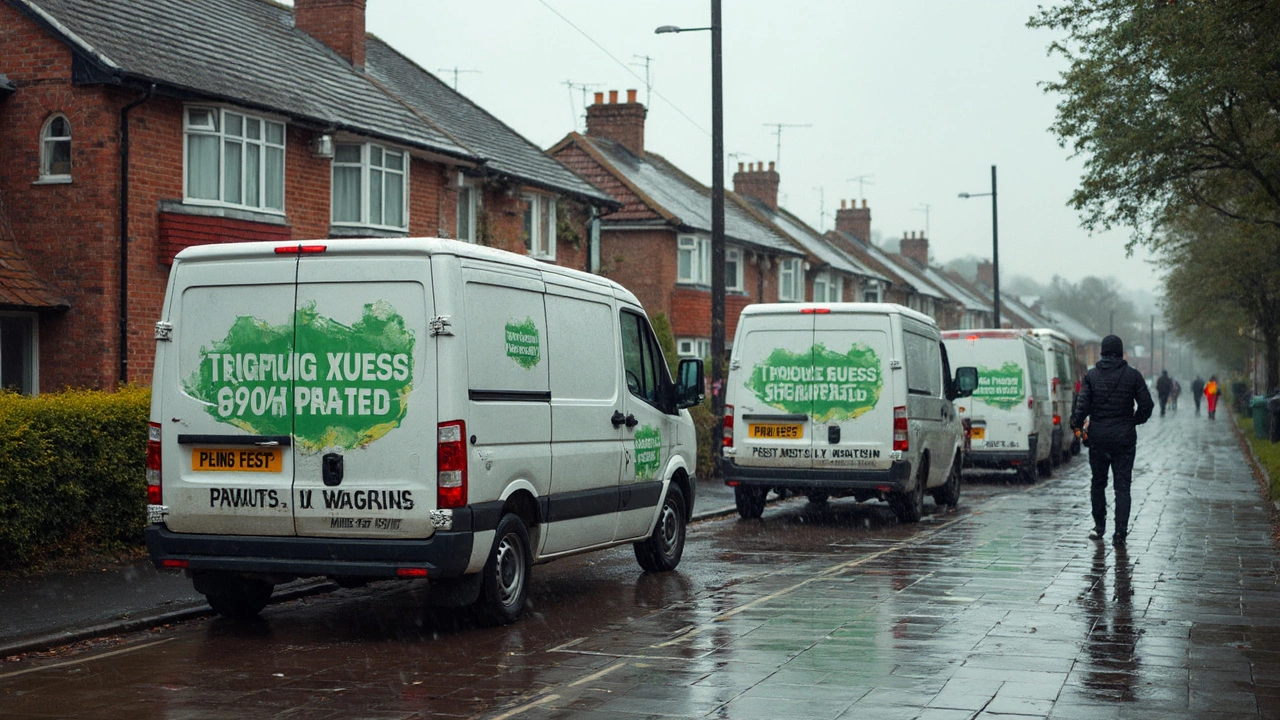Picture this: two houses, both caked in stubborn grime, both just as filthy as each other. The first owner forks out double what the second does for a sparkling clean patio and drive. Is one pro getting ripped off, or does pressure washing really come down to more than just firing up the machine and watching dirt vanish? Money talk in this business isn’t just about water and elbow grease—it’s knowing your worth, charging smart, and keeping both your calendar and your bank account stacked in your favour. Yet, plenty of folks, whether they’re side hustling or running a full-time operation, hesitate over their price list, second guessing what’s right, what’s cheeky, and what’s just not enough.
The Real Science Behind Pressure Washing Pricing
If you’ve been tempted to simply check what your mate down the road charges, copy and paste the price, and crack on—that’s common, but it’s not the best play. Setting your pressure washing rates is like piecing together a puzzle: there’s the going rate in your area, the size of the job, the kind of mess you’re dealing with, and the gear you use. Each of these factors stacks up to tell you how much you should charge for pressure washing jobs, whether it’s a shabby deck or all the way up to a London-street townhome.
Let’s get into the hard numbers for the UK, since that’s what people actually want. The average residential pressure washing job usually falls between £2 and £4 per square metre. But that’s just a ballpark. For patios and small drives in a city like Bristol or Manchester, you’re looking at a minimum job charge of maybe £50-£80. Out in the country or with bigger, tougher jobs? It’s not odd to see quotes topping £200, especially for larger surfaces, ingrained oil stains, or jobs that require special chemical treatments.
What a lot of folks miss is that commercial jobs can run much higher. Schools, shops, and offices bring bigger surfaces, more stubborn stains, and usually want it done outside of working hours. Rates for these can be anywhere from £3 up to £10 per square metre, and some even charge by the hour, anywhere from £30 to £60, depending on what’s involved and what’s at risk if something goes wrong.
Here’s a quick look at the numbers:
| Type of Job | Typical Rate (per m²) | Minimum Charge |
|---|---|---|
| Domestic Patio/Driveway | £2-£4 | £50-£80 |
| Commercial Forecourt | £3-£10 | £150+ |
| Decking | £3-£5 | £60+ |
| Walls/Fascia | £4-£8 | £75+ |
But don’t just latch onto numbers. Look deeper, because plenty can swing the final price. Are you providing water, or are they? Will you need specialist degreasers? Do you need to block driveways or get up on wobbly ladders to reach gutters and soffits? If there’s tons of moss or old paint, that’s extra time too. It’s pretty vital to scope each job and be honest about what’s involved. If the drive is cracked, weedy, or sunken, blasting it might turn small issues into big headaches, so always check the condition first and build that into your pitch.
The best pros in the business never rush quotes. They take time to measure accurately, ask about access, check water supplies, and even the angle of drains nearby. They also work out how far away the site is: turning up for a £60 clean that chews up half your day because the customer’s an hour’s drive away isn’t a smart call. Start factoring your travel time and costs in right from the jump.
Another thing: don’t be that person who forgets they’ve got bills to pay and gear to maintain. Your pricing should cover wear and tear on your pressure washer, chemicals used, insurance (never work without it!), fuel, and, yes, your time—even the unseen time spent setting up and packing away.

How to Set Your Pressure Washing Rates Like a Pro
If you’re starting out, there’s an understandable itch to undercut everybody and clean up—literally. But the quickest way to burnout is charging mates-rates everywhere and realising you’re making less per hour than a barista on a sleepy Tuesday morning. Start by working out your real-world costs each month: grab your logbook and jot down everything from nozzles and hoses to time spent quoting, cleaning, and travelling.
After you know what it really costs to run your setup (gear, petrol, insurance, admin), you can figure how many jobs you want or need to complete a week to hit your income goals. If you need at least £500 to cover costs and pay yourself even a modest wage, and you’re targeting 10 small jobs this week, you’ve got a simple minimum charge—anything less won’t work. Savvy business owners use spreadsheets, and some use job quoting apps that let you just plug in the square metres, location, and filthy extras to spit out a fair price instantly.
Hourly rates work, but only if their time matches the mess. Straightforward, regular jobs might take an hour, but you’ll inevitably stumble into a patio that takes double time because nobody’s cleaned it since 1979. Charging by the square metre keeps things transparent for you and your client, and means you don’t lose out if you work efficiently. Punchy minimum charges help stop time-wasters, and you can always offer discounts for larger or repeat bookings.
It’s worth being flexible but firm. List your rates online, but always say “from” to signal there may be extras. If someone queries your price, calmly break down what’s included—insurance, travel, waste disposal—and explain why hiring a pro is safer and faster than doing it themselves. Never drop your price just to get the gig; it only cheapens the industry and makes it harder to charge fair rates in future. If you get stuck, check a few local websites or ask in pro Facebook groups to get a sense of average charges in your town.
The best jobs are those that go smoothly and lead to more work. So sweeten the deal for potential regular customers: offer bundled discounts if they book two or three jobs at once, or create a loyalty card for yearly cleanings. There are apps and software that’ll let you schedule reminders, keep track of who needs a nudge, and even send quotes with one tap.
Finally, don’t forget customer service. A friendly, tidy operator with insurance and a good attitude will always attract better-paying work than a rush-job cowboy who soaks the rose bushes and leaves wet footprints on the lawn. People talk, and glowing word-of-mouth or a Facebook recommendation from a grateful customer will do more for your business than undercutting your rivals ever could.
- Be clear about what the price covers
- Always inspect the job before quoting if you can
- Don’t forget travel time and monthly costs
- Adjust rates for size, difficulty, and job location
- Insurance is not optional
- Offer package rates for regular customers to boost loyalty

Frequently Asked Questions and Hot Tips for Pressure Washing Pricing
Alright, so now you’ve got a grip on the maths, but there are always a few curveballs in this line of work. For one, people love to ask, “Why are you more expensive than my cousin’s mate who’ll do it for £30?” And here’s the rub: quality, experience, and peace of mind aren’t free. If your quote comes with insurance, specialist cleaning for oil or rust, or you’re using industrial gear that gets the job done twice as fast—spell that out.
When quoting a customer, use actual measuring tools or an app (there are loads for iPhone and Android now) to work out the precise surface area. People trust numbers more when you say, “It’s 50 square metres, and my rate is £4 per metre, so that’s £200, all in.” You’re already ahead of the many who just guess and hope for the best. Avoid pricing over the phone unless it’s a repeat customer who knows the drill—photos or an onsite visit always work better. If you end up seeing much more work than advertised, say so on the spot—no one appreciates hidden charges after the fact.
If you’re tackling special materials (timber decking, fragile Indian sandstone, delicate render), always include a cleaning patch test and mention the extra care taken. It helps justify the rate and reassures the customer you care about the outcome, not just blasting and legging it. Some materials need low-pressure soft washing, which takes more time and gentler chemicals—factor that in. For north-facing walls and patios in the UK, you’re more likely to see algae, so consider a biocide finish as an upsell. These little extras add value and set you apart.
Nobody likes a surprise, so spell out if you charge for extras like weed removal, chemical cleaning, or moving heavy items. Make these clear either on your website or in the quote itself. Don’t forget waste disposal either—you can’t just hose muck into the drain, not legally. Some councils require you to take solid waste away, and that takes time and possibly a skip. If it’s a filthy job, quote for PPE and potential equipment hire, like a cherry picker for hard-to-reach facias.
And here’s a golden tip: always build in a wet-weather clause for outdoor work in Britain. Tell customers that rain and high winds can push jobs back, so they know you’re at the mercy of the forecast, not just dragging your feet for no reason. Most are understanding when you explain you can’t safely run electric kit outside in a monsoon.
Lastly, don’t forget your own boundaries. Set a minimum charge for small jobs and be willing to walk away if a customer tries to haggle you out of fair pay. The UK cleaning scene is busy—but no successful pro ever started by giving their talent away.
